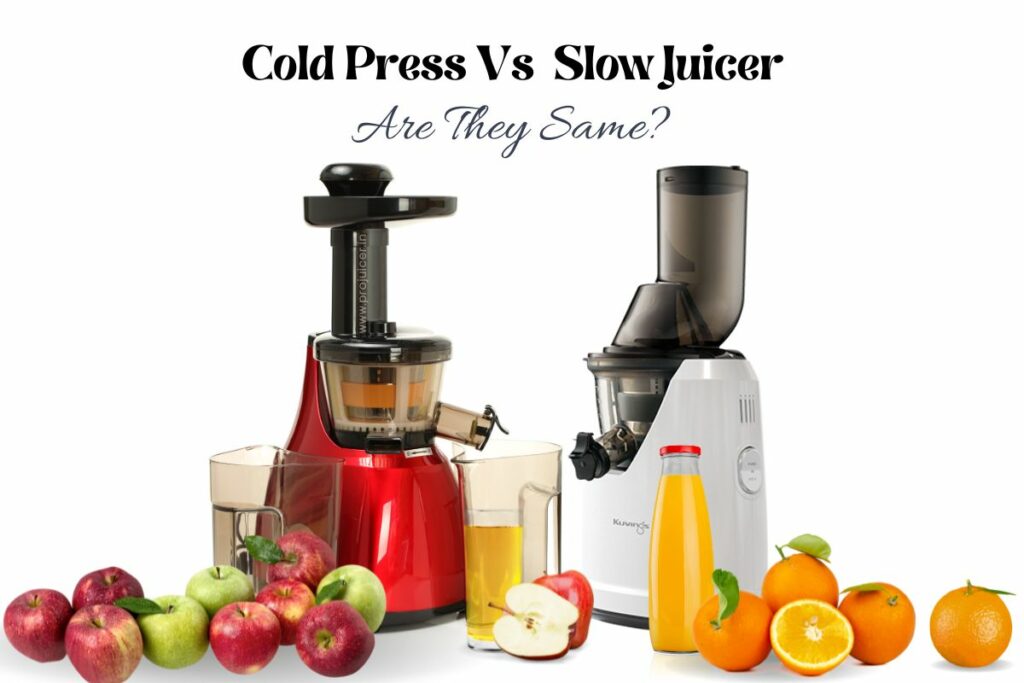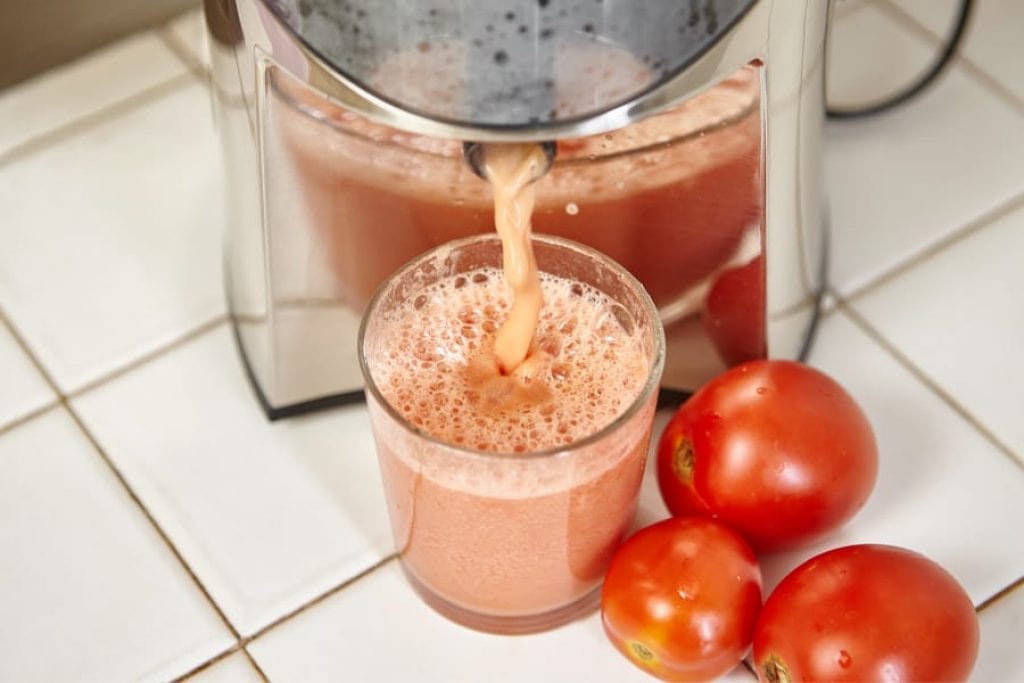When choosing a juicer, you may have recently come across the terms COLD PRESS JUICER and SLOW JUICER. But, what’s the difference between cold press and slow juicers? Or is there even any?
To spare you confusion, I have written this in-depth article explaining both terms with their similarities and dissimilarities to find out if they are the same or not.

Are Cold Press Juicers And Slow Juicers The Same Thing?
No. Both cold press juicers and slow juicers refer to the same type of juicer that juices through mastication. However, the terms “slow” and “cold press” indicate the different properties or benefits of using those juicers. Sounds interesting! Isn’t it?
A cold press juicer contains an auger that crushes the fruits to make a pulp. This pulp is then pressed slowly against a mesh to extract the juice. If you have used a mortar and pestle in the kitchen, then cold press juicers work exactly like that, but powered by a motor.
Masticating juicers are often called “cold press juicer” because they crush the produce and extract the juice without generating any heat and degrading the juice quality. To prevent heat generation, these juicers run at a slower pace compared to other juicer types. Hence the name “slow juicers.”
Cold press juicing or mastication usually refers to “chewing”, and here, the juicer first “chews” the produce and later extracts the juice. Since this process happens at a slower rate of 80-100 RPM, they produce little heat and provide amazing juicing benefits.
Is A Slow Juicer Better Than Other Types Of Juicers?
Now that you know cold press juicers are the same as slow juicers, you might wonder how good they are compared to the other types of juicers, such as centrifugal and hand juicers.
Slow juicers are definitely better than their other counterparts simply because of the quality of juice they produce. I have used both centrifugal and cold press juicers and swear by the latter’s ability to produce great-tasting nutritional juice.
With the centrifugal juicer, I noticed the juice was more watery and lacked consistency. It also separated very quickly into layers which rendered it unfit for drinking after just one hour of juicing. On the other hand, cold-pressed juices last for 3-5 days in a refrigerated space without any degradation in the quality.
While these physical changes in the juice made by other juicers are easily detected visually, what you can’t see is how it chemically alters the juice. Check the following video of juices made with a slow juicer and a high-speed juicer to understand the difference more clearly.
Due to the high-speed operation of centrifugal juicers, they generate a lot of heat and end up heating the juice too. The extracted juice, which contains heat-sensitive micronutrients, loses its nutritional value as the nutrients break down due to the temperature. The speed also generates a lot of foam which leads to the oxidation of nutrients.
The only feature I loved about centrifugal juicers was their fast operation. They are “fast juicers” that work at high speed and produce juice in minutes. You can prepare an entire glass of orange juice in less than five minutes with centrifugal juicers. But overall, these juicers give out juices with low nutritional content and a watery taste.
If you compare cold press juicer with centrifugal juicer, you will find the latter works at a speed of 15,000-22,000 RPM and produces considerable heat to deteriorate the nutrition quality. That’s why slow juicers have become extremely popular among health enthusiasts.
When I switched to cold press juicers, the difference in quality was apparent:
- The juice from the cold press juicer doesn’t heat up or produce foam. This gives a glass of juice that is tastier and loaded with nutrients.
- Cold press juicer gives a high juice yield. For the same amount of fruits, I noticed a 30% increase in the quantity of juice produced compared to the centrifugal juicer. This also results in low wastage as the juicer gives out extremely dry pulp.
- Besides juicing hard vegetables like carrots, I can easily juice my greens and other delicate vegetables in the slow juicer. The centrifugal juicer couldn’t process greens which limited the number of juice recipes I could try.
Even if cold press juicers are expensive, my investment in a good-quality juicer is justified by the amazing benefits it gives. If you want to buy a cold press juicer, I recommend researching thoroughly to find one that fits your budget.

Which Slow Juicer Creates The Best Quality Cold-pressed Juice?
Not every slow juicer in the market is capable of producing great quality cold-pressed juices. In my experience, Hestia and Kuvings are the best brands for producing the most nutritious cold-pressed juice. I have used the many cold press slow juicers in my career as a mixologist and found these two worthiest:
1. Hestia Nutrimax Cold Press Juicer
Hestia Nutrimax is a vertical cold press juicer that has a user-friendly design. The juicer comes with an 81 mm wide feeding tube, enough to fit an entire apple. It also comes with three types of strainers to adjust the consistency of the juice. The 46 RPM speed makes Hestia Nutrimax Cold Press Juicer ideal for people who are looking for a slow juicer to produce best quality cold-pressed juice. Besides, it is easy to use, clean and maintain.
2. Kuvings B1700 Cold Press Slow Juicer
Another vertical cold press juicer, Kuvings B1700, comes with an award-winning design and superior quality. With its patented technology, Kuvings boasts a 10% higher yield compared to ordinary juicer machines. You can make anything from smoothies and sorbets to even nut milk, as the juicer processes almost everything. With 50 RPM slow speed, you can continue juicing worry-free with the Kuvings B1700 Cold Press Juicer.
In Conclusion
Whether you call them cold press or slow, these juicers are one of the best investments you can make. The nutritional benefits, such as no oxidation or degradation, makes them highly attractive if you are a health enthusiast.
Even if they cost more than traditional juicers, cold press juicers give you benefits far more than the money’s worth. But before you make an investment, look at some of the best cold press juicers and decide according to your requirements.

